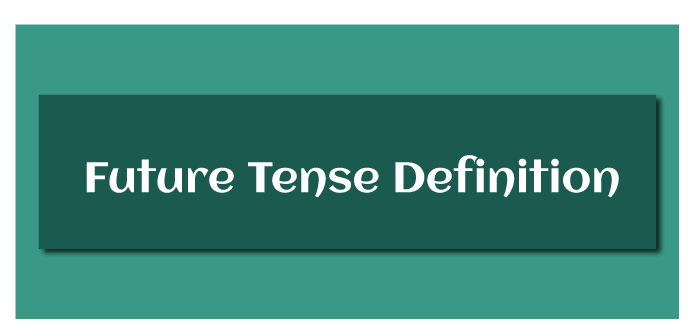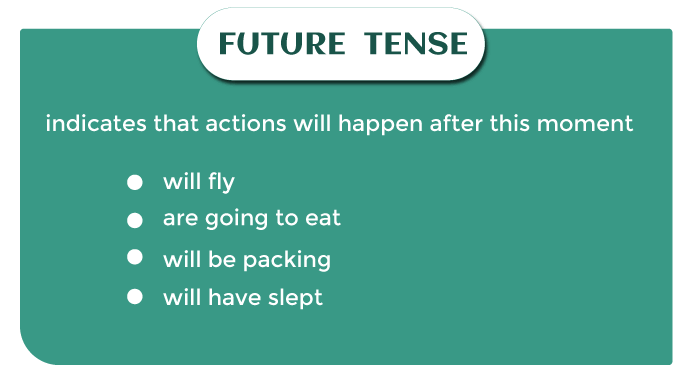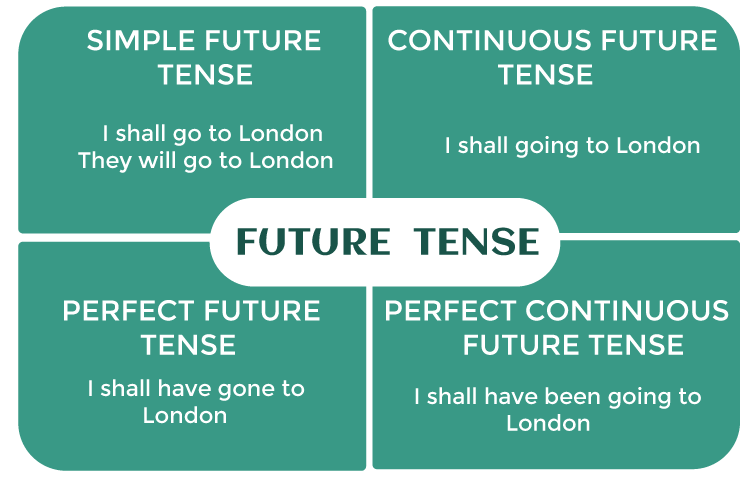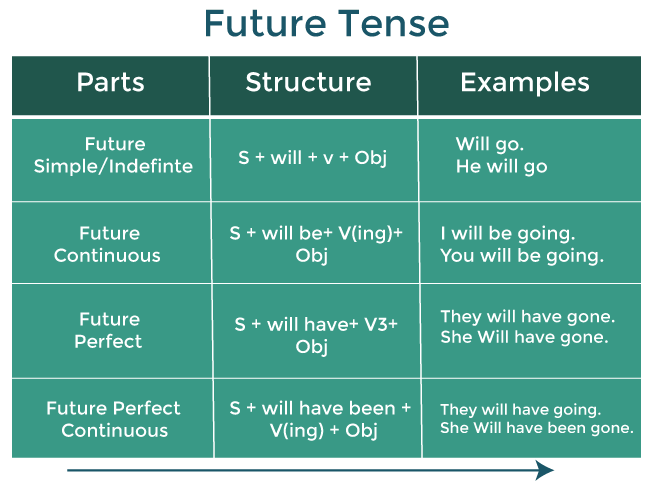Future Tense Definition
The future tense is a foundational element of English grammar, a strong tool which permits us to discuss events that have yet to occur. The future tense, one of the 12 tenses in English, is used to represent actions or conditions that will take place at a later time.
The future tense allows us to communicate about events that have not yet occurred but are expected or projected to occur in the future, from arranging a future vacation to creating hypothetical scenarios.

The future tense is essential in our capacity to communicate in English, whether we're making forecasts, delivering commands, or expressing aspirations and dreams.
In this journey of understanding the future tense, we will look at its various types and uses, that make it an interesting and vital part of the English language. So, sit back, relax, and prepare to enter the intriguing realm of English grammar's future tense.
What is Future Tense?
The future tense is a types of tense that is essential and vital to properly understanding of the English language.
It is a kind of tense that allows us to discuss and communicate about future happenings. It also helps us describe activities or occurrences that have not yet happened but are expected or projected to happen in the coming future.
It is essentially the conjugation of a verb in a certain forms to imply that something will happen in the future. We can use the future tense to make projections, anticipate things, predict, organize events, and even think of hypothetical scenarios that are no where but can happen in coming times.

Future Tense Definition
According to the definition given in the dictionary, the future tense can be understood in an array of ways.
- The future tense, as per the Cambridge Dictionary, is "the type of a verb you'll utilize when talking about anything that is going to occur or exist."
This definition highlights the concept of using the future tense to explain events that have yet to occur but are predicted to occur. Similarly, the future tense is defined as "a tense of verbs utilized when the action or event described is to occur after the time of utterance." This definition highlights the temporal nature of the future tense, emphasizing that it is used to communicate about events in the future.
- The future tense is defined by Merriam-Webster as "a verb tense that is utilized to refer to the future." This definition emphasises on the future or upcoming time in Grammatical sense.
The definition highlights that it is a certain conjugation of a verb that is used to express future events. As the matter of fact, the future tense is formed by utilizing auxiliary verbs. These include "will" or "shall," or by attaching certain suffixes to the base form of a verb. For instance, "I will eat lunch" or "She will be researching."
Knowing the future tense is essential for good English communication because it allows us to convey concepts and activities that have yet to occur with clarity and precision. It's a tense one that enables us to guess, plan, and envision, allowing us to explore a world of possibility and potential.
From making weather predictions to arranging a journey to a foreign location, the future tense allows us to describe our intents and goals in a precise and convincing manner.

Types Of Future Tense
In English, the future tense can be of four different kinds, each type of tense suggests a particular type of action or event that will occur in the coming time or the future. The main forms of Future Tense include- The Simple Future Tense, Future Continuous Tense, Future Perfect Tense, and Future Perfect Continuous Tense.
- The Simple Future Tense is used to indicate a future activity, such as "I will got to Germany next year." This tense is formed by incorporating "will" or "shall" to the verb's base form.
- The Future Continuous Tense is used to describe a continuing action that will occur in the near future, such as "I will be preparing for my test next week."
This tense is formed by combining the auxiliary verb "will" or "shall" with "be" plus the verb's present participle form.
- The Future Perfect Tense is used to indicate an event that begins in the present and will take place in the future, like "By the time we show up, the film will have commenced." This tense is formed by combining the auxiliary verb "will" or "shall" and "have" and the verb's past participle form.
- The Future Perfect Continuous Tense is used to describe an action that is taking place now but will be completed later, such as "I will have been practicing at the institution for five years next week."
This tense is formed by combining the auxiliary verb "will" or "shall" with "have been" and the verb's present participle form.
Mastering the many forms of the future tense allows us to communicate about future occurrences and activities more effectively, as well as express distinct nuances of time and duration. Mastery of the future tense is an important part of English grammar that can substantially improve our capacity to express ourselves accurately and precisely.

Usage of Future Tense
The future tense is a grammatical tense that is used to indicate upcoming occurrences or acts. It is created by combining certain words or particles with a verb's present tense form. The future tense can be be applied or used in various ways, however their usage depends on the situation and event. In this section, we will look at how to use the future tense in English Language.
- Communicating future actions: The most common usage of the future tense is to express future acts or happenings. "I'll go to the supermarket next week," for instance, or "She'll be here next week."
- Making forecasts: The future tense is also utilized for expressing probability or to make forecasts about future occurrences. For instance, "It will snow tomorrow" or " The economic situation will improve next year."
- Speculation about the present: The future tense may also be utilized to hypothesize about the present. For instance, "He must be resting now" or "They might be enjoying a film."
- Making promises or making offers: The future tense is frequently employed for making pledges or making offers. For instance, "I will call you tomorrow" or "We will assist you moving next Monday."
- Using the future tense to indicate willingness: The future tense can be utilized to convey willingness or desire to undertake something. "I will assist you with your assignments," for instance, or "She will accompany us to the celebration."
- Discussing or communicating about upcoming events: The future tense is used to describe occurenses that are scheduled to occur in the future. "The train will leave at 10 pm." or "The bus will reach at 10:30 a.m."
- Worries or confusion about the coming time: The future tense can be utilized to communicate the doubt or worry about the future. For instance, "I wonder what will occur next" or "They might not show up on time."
Overall, the future tense is an important aspect of English grammar since it can represent a wide range of meanings and purposes. You can interact more efficiently in both written and spoken English if you learn the use of the future tense.
Rules Of Future Tense
The future tense is a verb tense that describes activities or occurrences that will occur in the future. According to the contents of the sentence, the future tense in English can be constructed via a variety of grammatical forms. The rules for forming the future tense sentences in English are as follows:
- To create the simple future tense, combine "will" with the basic form of the verb: In English, this is the most typical technique to produce the future tense. Simply put "will" prior to the root form of the verb to use this arrangement. For instance, "I will go to the shop today."
- This form is used to express an act in the future that is planned or expected. For instance "She is going to see her mom next week,"
- For describing future setups, use the present continuous tense: The present continuous tense may additionally be employed to indicate pre-planned future events. For instance "I'm visiting a friend for dinner tomorrow,"
- To describe ongoing future acts, use "will" + be + present participle: This arrangement is used to represent actions that will be taking place at a later date. For instance, "We will be preparing for our tests at this time next Monday."
- To express willingness, use "shall" with "I" or "we": In formal English, the word "shall" can be utilized rather than "will" to signify a readiness to do something. For instance "Shall we meet for coffee?"
- To describe completed activities in the future, use the future perfect tense: The future perfect tense is constructed by combining "will have" and the verb's past participle. This tense is utilized to indicate future acts that must be accomplished by a specific date. For instance, "By the time she shows up, I will have completed my schoolwork."
- To represent future potential or probability, use modals: To communicate possibility or probability concerning future events or actions, modal verbs such as "may," "might," "could," and "should" can be employed. For instance, "It might snow today" or "You should come at the gate two hours before your departure."
- To describe upcoming or scheduled occurrences, use "be to" or "be about to": "Be to" or "be about to" + base form of the verb can be utilized to denote events that are about to occur or are slated to occur in the near future. For instance: "The performance is about to begin" or "She is to meet his manager next week."
- To represent a future circumstance, use "unless": "Unless" is used for expressing a condition that must be fulfilled for a future action to occur. For instance, "I won't go to the event unless my partner comes with me."
- To describe planned or routine future activities, use the present simple tense: The present simple tense can be utilized to indicate scheduled or routine future occurrences such as timetable or schedules. "The bus leaves at 7 p.m. each day," for instance, or "The meeting begins on Tuesday."
- Usage of time adverbs for expressing future events: Time adverbs like "soon," "later," and "next" are helpful for denoting a future time. For instance, "We shall meet soon" or "She will come later today evening."
By following these rules and standards, you will be able to properly utilize the future tense to talk about future occurrences and activities in English.
Common Mistakes of Future Tense Usage
Here are some frequent errors and omissions while using the future tense in English:
- Not using auxiliary verbs: It is critical to utilize auxiliary verbs like "will" or "be going to" just prior to the main form of the verb while making sentences with future tense. For instance "I go to the office next Monday, " is an incorrect sentence and usage of future tense, whereas "I will go to the office next Monday" is correct future tense sentence.
- Lack of clarity in usage between "will" and "going to": The term "will" and "be going to" both represent future activities, and most importantly they cannot be substituted for one another. "Will" showcases instant action/ event or forecasts, whereas "be going to" showcases planned or intended activities.
- Use of the present simple tense inaccurately: Though the present simple tense can be used to depict future events, it must only be utilized for planned or regular events. "The train departs at 7 p.m. every day," for example, is correct, although "I depart for my flight tomorrow" is incorrect.
- Incorrect usage of time statements: For indicating future time, time expressions should be utilized correctly. For instance, "I will see you today" is right, however "I will see you later tonight" is incorrect.
- Making promises or threatens in the future tense: While the future tense might be used to make forecasts or communicate intentions, it shouldn't be utilized to make promises or threats. For instance, "I will pay you back the following weekend" is appropriate, but "You will rue it if you don't support me" is not.
- Failure to utilize the future perfect tense when it is appropriate: The future perfect tense is utilized to represent completed future actions. When this tense is not used when it is suitable, it might cause misunderstanding or ambiguity. "I will have been studying here for four years next week," for instance, is correct, however "I will study here for four years next week" is not.
- Using the future tense to express past events or happenings: It is common for learners to mistakenly use the future tense to represent past events or acts. "Yesterday, I will visit to the shop," for instance, is incorrect, whereas "Yesterday, I visited the store" is accurate.
- Excessive use of the future tense: While the future tense is important for discussing future occurrences and activities, it should not be misused. In certain situations, using the present tense or another tense for exhibiting the future occurrence may be more relevant and appropriate. "I'm going to the seaside next week" is more casual sentence than "I will go to the seaside next week."
- No usage of contractions while making future tense sentences: While speaking English, contraction such as "I'll," "you'll," and "we'll" are widely used to communicate in the future tense. Using contractions incorrectly might make your voice or writing sound stiff or official.
- Incorrect negative tense formation: To make the negative future tense, employ "will not" or "won't" prior to the base form of the verb. "I won't go to an event this evening," for instance, is correct, although "I will not go to the event this evening" is more formal and less usually used in spoken English.
- Incorrect question formation: To make a question in the future tense, position the auxiliary verb preceding the subject. "Will you come with us to the gathering tonight?" is correct, whereas "You will come with us to the gathering tonight?" is incorrect.
You may enhance your understanding of the future tense in English and communicate successfully about future events and activities by being aware of these typical faults and mistakes.
Examples of Future Tense Sentences
The future tense is a kind of tense that helps in expressing future events and happenings. It is a tense type that is often used in English, and it helps to expressing the speaker's future aspects . Let us look at some examples of the future tense. These will help you better understand correct usage and rules of future tense correctly as you use it in your conversations and writings.
Examples Of Simple Future Tense
- I will go to London next month.
- Jenny will start her college next week.
- We will purchase a new house next year.
- I will graduate this winters.
- We will attend the party this February.
- The enterprise will come up with a new model this year.
- My father will call you tomorrow evening.
- We will have the lunch tomorrow at the 5 star hotel.
- He will pass the tests if he works dilogently.
- She will finish the painting by next weekend.
- I will learn to speak French this summer vacation.
- My mother will visit my grandparents in London this Christmas.
Examples Of Future Continuous Tense
- I will be going to the beach with my friends tomorrow.
- She will be working on the project all the afternoon.
- The team will be preparing for the final match next week.
- I will be writing an article this weekend.
- We will be organizing a family dinner next Saturday.
- Lisa and her husband will be going for shopping tomorrow afternoon.
- I will be planting fruits and vegetables in my lawn this Autumn.
- He will be cooking tasty dishes for his parents this week.
- He will be dancing at the wedding anniversary celebration of his parents.
- I will be learning to paint this vacation.
- She will be teaching her kids to swim next month.
- We will be practicing the dance moves before the party begins.
Examples Of Future Perfect Tense
- Jonna will have completed her project by 8pm today.
- I will have saved funds to travel around the world in 1 year.
- I will have done all the tasks on my board by tomorrow evening.
- Jira will have completed his household chores by 11 am tomorrow.
- We will have been together for 5 years by next Winters.
- They will have visited all their relatives by next week.
- Our organization will have purchased new furniture in 6 months.
- The executives will have read all the terms and conditions of the contract by today evening.
- I will have learned playing the card game like a professional by next week.
- Maria will have mastered the marketing techniques by next month.
- The workers will have completed the repair work by next Tuesday.
- She will have finished her vacation homework by next week.
Examples Of Future Perfect Continuous Tense
- Enna will have been competing her homework by 8 Pm
- I will have been standing in the sun for3 hours before the office opens.
- He will have been playing for 3 hours by 2 pm.
- Jira will have dancing for 3 hours before the theatre closes.
- They will have been walking for 2 hours by the time they reach their destination.
- They will have been visiting all their relatives by next week.
- If they come again tomorrow, they will have been coming for 2 days continuous.
- The executives will have been studying the product for 2 hours by 7pm.
- I will have been learning to play the card game by the dinner .
- Kids will have been watching the Television for 3 hours by the time their parents come.
- He will have been reading the novel for 4 hours by the time she finishes it.
- She will have been sitting for two hours by 9 pm.
Conclusion
Thus, future perfect tense is an important aspect of English Grammar, as explained above it is used to represent any action or event that will have occurred or been finished at some point in the future, indicating that the incidents will have occurred before another completed action or at a specific period in the future.
Understanding future tense can help learners speak and write efficient English Language.
|




 For Videos Join Our Youtube Channel: Join Now
For Videos Join Our Youtube Channel: Join Now










